Fatherhood is Forever
A resource booklet for First Nations and Metis parents in Manitoba

In this issue:
Why are fathers important? Exploring fatherhood Different situations, different approaches
How you can be involved

A resource booklet for First Nations and Metis parents in Manitoba

In this issue:
Why are fathers important? Exploring fatherhood Different situations, different approaches
How you can be involved
This resource is one of a series of four parenting resources for First Nations and Metis parents and caregivers in Manitoba. It was developed in response to expressed interest from Manitoba families and community partners for useful, culturally appropriate parenting information. The resources were first developed by the National Collaborating Centre for Indigenous Health (NCCIH) and the BC First Nations Health Authority (FNHA), in partnership with Best Start Resource Centre at Health Nexus and Indigenous parents, family members, Elders and community partners in British Columbia.
The booklets in this series include:
• Growing up Healthy
• Parents as First Teachers
• Fatherhood is Forever
• Family Connections
Several people contributed to the Manitoba adaptation of the BC parenting booklets by sharing their stories, teachings, ideas, Indigenous languages translations and photos. We would like to thank the following people for helping with this adaptation project:
• Joanne Brown, Attachment Network of Manitoba
• Healthy Baby Program Team, Healthy Child Manitoba Office
• FASD team, Healthy Child Manitoba Office
• Manitoba Health, Seniors and Active Living
• Sheila Murdock, Manitoba First Nation Education Resource Centre
• Rachelle Neault and Sharon Wilson, Métis Community Liaison Department, Manitoba Métis Federation
• Jaime Cidro, University of Winnipeg
• Jason Parenteau, Spotlight Probation
• Early Learning and Child Care, Families
• Rick Boucher, Dufferin School
• Tamara Beardy, Children’s Hospital Research Institute of Manitoba
• Karen Davis, Early Years Facilitator
• Lianna Wanbdiska, First People’s Child Care Association
• Rita Cullen, Metis Child & Family Service Authority
• Delores Wallbridge, Peguis Family Centre Head Start Program
• Annie Ballantyne, Grand Rapids School
• Donna Young, OCN Child & Family Services
• Gilbert Fredette, Norway House Cree Nation
• Jean Johnson and Lynda Wright, NCN Family & Community Wellness Centre
• Jenilee Lengyel, Ruth Betts Community School
• Marian Paul, Nor Man Regional Parent Child Coalition
• Vivian Scott, Cross Lake Early Childhood Education Centre
• Best Start Resource Centre at Health Nexus
Wendy McAllister, Manager
Alison Benedict, Health Promotion Consultant
• National Collaborating Centre for Indigenous Health
Margo Greenwood, Academic Lead
Donna Atkinson, Manager
Roberta Stout, Research Associate
Regine Halseth, Research Associate
Lesa Cauchie, Communications Officer
• Healthy Child Manitoba Parenting Initiatives
Indigenous Initiatives and Parent Child Coalitions
© 2017, 2025 National Collaborating Centre for Indigenous Health (NCCIH) * and the Manitoba Government. Production of this series of publications was made possible, in part, with funding from the Public Health Agency of Canada (PHAC) and the Manitoba Government. The views expressed herein do not necessarily represent the views of our funding partners.
This booklet was adapted from the BC booklet, Fatherhood is Forever, published in 2013 in partnership with the BC First Nations Health Authority (FNHA). You can view the 2019 BC booklet online at: nccih.ca/495/Fatherhood-Forever-BC.nccih?id=92
* On May 30, 2019, the National Collaborating Centre for Aboriginal Health (NCCAH) officially became the National Collaborating Centre for Indigenous health (NCCIH).
ISBN (print): 978-1-77368-568-7 ISBN (online): 978-1-77368-569-4

Welcome to the most important and challenging journey of your life – fatherhood. As a father, you make a big difference in the lives of your children. Many fathers want to be more involved with the parenting of their children. This booklet is intended to help you become a confident and effective father.
This booklet shares stories, culture and knowledge about being a father. It includes information about traditional fathering, why fathers are important, and how they can stay involved with their children. Throughout this booklet, you will find highlighted textboxes with links to additional resources that you can check out for more information about the subject matter. At the end of this booklet, there also is a list of organizations that offer a wide range of culturally-appropriate programs, resources and services to help you achieve the best possible outcomes for your children.
Teach your children the way to live.


“We have the opportunity now to be fathers. People don’t realize how the ‘60s Scoop and Residential Schools still really affect us as men. Some of us didn’t grow up seeing a father in a positive way. I do the best that I can. I see my children, they are small and they depend on me. Being a father for me is getting up, going to work every day, and making sure my children have a good home and more than anything, making sure that they are happy.
I can’t explain it but it is such an amazing feeling to know that your children can look at you and be happy. I can see when they are happy and know that they just love me unconditionally. As a man it is okay to share with your children, let them know they are loved and cared for. Hold them. That is the one thing that children help fathers to find is to be able to express that. Being a father is ongoing, it is not just being a disciplinarian: it is about teaching our children how to become men and women.”
– Jason Parenteau (Anishinaabe/Winnipeg)
A father takes responsibility for the children in his life. Many adults grew up without a positive, healthy role model of fatherhood. It is often when parents hold their baby for the first time that they take a good, hard, look at what it means to raise a child. Your responsibilities as the father of your children starts long before they are even born.
Mothers can do an amazing job in raising their children, but there are some things that only fathers can teach to their children. It is important for you to be as involved as possible in raising your children, right from the time you find out you are going to be a father. The earlier you get involved in the healthy development and parenting of your children, the more connected you will be with your children, as they grow to understand that they are important to you.

Most fathers want to provide a safe place for their children to grow up healthy. This includes things like adequate housing and sanitation, clothing that is appropriate for the weather, food and water, education and healthcare. It also includes things like love, guidance, security, encouragement and attention. Your local friendship centre, parent-child coalition, family centres in schools, and community support programs offer free services to help with parenting and providing for your children. When your children’s needs are met, they learn to trust that you have their best interests in mind, at all times.
Children watch how you spend your time. They learn about the things that matter most to you. When you spend time with your children, they learn that they are worthy of your time. It shows them that they are important to you. By spending time together, fathers and their children learn about each other and develop a healthy relationship.
It is not only the amount of time you spend with your children that is important, it is also the quality of the time spent with them. When you spend time with your children:
• Focus your attention on them. Listen to what they have to say and look at them when they are telling you something.
• Do things that interest them. Involve them in things that you like to do.
• Go outside whenever possible. Get away from the television and the video games, and put away the cell phones and other electronic devices.
• Learn more about your children’s lives outside of the home. Be aware of their friends, and know how they are doing in school.
• Encourage their success and talk with them about things that are happening in their lives. Your children look to you for approval and help.
• Get to know what your children need to learn and how you can support them in their learning. Make sure they get what they need to be successful in school and beyond.
Children need to know that they are loved by their father. Your children need to hear you say, “I love you.” They need to be hugged by you, regularly. This can be difficult for some fathers, especially if they did not grow up in a caring home with their family and community to support them. Some fathers are not comfortable with emotions. Even if you have a hard time expressing your emotions, you can show your children that you care about them through your actions. For example, you can take your children for a walk, play tea party with them, or share stories. By showing your children that you enjoy being with them, you help them to know that they are important to you.
It is important that parents are on the same page when it comes to boundaries, discipline and roles within the family. Children do well when they see their parents working together, whether they are living together or not. Think about how you talk about and relate to the other parent of your children. Show your children that you respect your partner by talking and interacting with them in a healthy way. By acting respectfully toward your children’s parent, your children learn to also respect their parents and behave appropriately toward them.
For the Sake of the Children
Phone: 204-945-2313
Toll Free: 1-844-808-2313 gov.mb.ca/familylaw/parenting/for-the-sake-of-thechildren.html
Your children learn more from what they see you do than from what they hear you say. They watch how you spend your free time, what your attitude is toward hard work, how you talk about other people, and how you choose to show and deal with your emotions, especially anger. As they watch your behaviours and attitudes, your children learn how to get along with other people. They learn about the value of working hard, regardless of whether your work involves paid employment or taking care of tasks around your home. More importantly, they learn that they are a priority to you. You want to bond with your children. Children bond with people who model good behaviour and a positive attitude. They feel secure with people they trust and respect.
Fatherhood involves a lifelong commitment. Your role as a father starts before pregnancy and continues throughout your children’s entire life. As a father, you play an important role in the healthy development of your children, from their early childhood, through their middle years and adolescent development, and into their adulthood. It is helpful to learn about the challenges that come with parenting through each stage of your children’s life cycle and about what you can do to support the healthy development of your children. Children need to know that you will always be there to love and support them in all that they do, regardless of their age. As your children grow, so will your relationship with them.

Children look to their father to teach them about life. Give your children amazing stories that they can share with their own children when they become parents. A great way to do this is to learn about your own heritage, culture and language:
• Learn about your past and where you came from. Share what you learn with your children.
• Talk with your children about their grandparents and extended family.
• Tell your children stories about your life experiences. Help them to get to know you.
• Share your skills with them, like fishing, drumming, jigging, drawing or painting, or playing a sport.
• Get involved in your children’s learning and school life. Visit their classrooms and share stories about your family, community and traditions, such as crafts, gathering medicines, fishing and hunting.
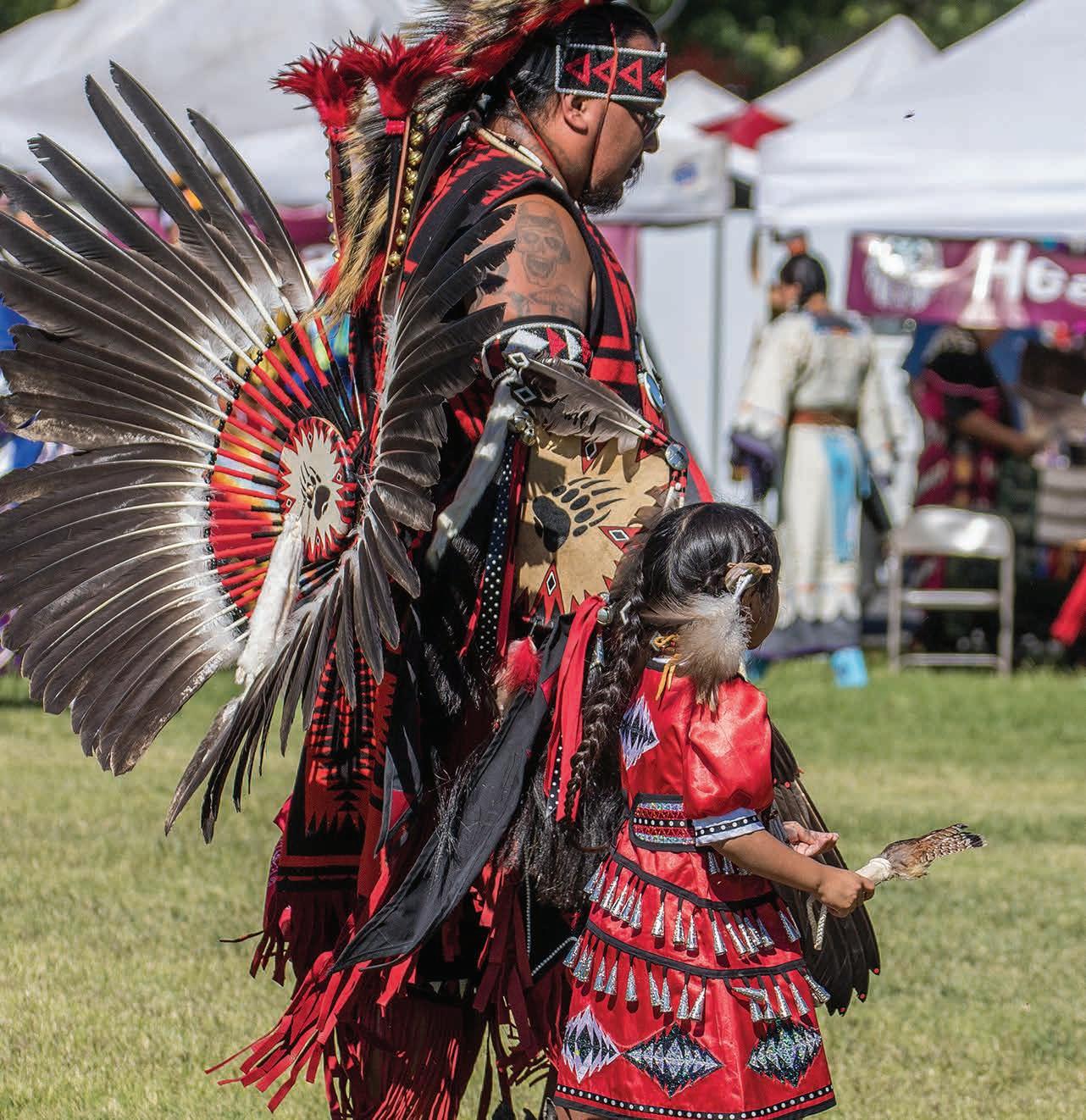
Children develop a strong sense of identity and belonging when they know about their community and cultural traditions. Connecting your children to their community and cultural traditions creates a source of comfort and support for them, especially when times are difficult. It helps them know who they are, where they came from, why they are here and where they belong. It links them to you, to their extended family, and to their community. There are many ways to connect your children to their community and cultural traditions:
• Tell your children about their ancestors. Introduce them to the Elders you know, or go meet some Elders together. You can become connected to Elders through your local friendship centre, healing lodges, communitybased programs and Indigenous organizations.
• Take your children to cultural events such as community feasts, pow wows and other Indigenous celebrations. There usually is no cost to attend these gatherings.
• Take your children out on the land. Teach them about respecting animals, nature and our waters.
• Share personal teachings or learn together about your traditional practices, such as berry picking, hunting, fishing, trapping and harvesting.
• Teach your children their First Nations or Metis language or learn the language, together.
Talk with your children, even when they are babies and cannot use words to respond.
Elders say children’s spirits choose their parents. This means that your children chose you to be their father. It also means that you have an obligation – and an opportunity – to develop a strong and healthy relationship with your children. Whether you are a biological parent, adoptive parent, step-parent or foster parent to your children, the father-child relationship that you develop with each of your children will influence almost everything you do as a father.
Children want to look up to a man they can trust. They want to have a father who guides them in a good way. Careful guidance builds a close, respectful relationship. It also teaches children how to be good parents and strengthens the generations that follow. Fathers are important because they provide a balance in their children’s lives and help guide them along the path to healthy development.
Children need guidance from a father who cares about them. Being consistent with your parenting practices helps your children feel safe and secure. Your children need to know what to expect from you and what you expect from them. They need to feel safe making mistakes and should not be afraid to ask questions.
• Praise your children when they do well or when they try their best to do something.
• Set limits for your children and take action as promised, when boundaries are crossed.
• Be firm and use a calm, understanding and positive approach to teach or guide your children’s behaviour.
Best Practices for Guiding Children’s Behaviour gov.mb.ca/education/childcare/resources/pubs/ bp_children_guide_en.pdf
Giving clear guidance starts with taking good care of yourself. This means staying on top of your own physical, mental, emotional and spiritual well-being. Self-care is important for healthy parenting because it helps to reduce stress, increase resiliency and prepare for life’s challenges. There are many things you can do to keep your mind, body and spirit healthy. Here are a few examples:
• Do a physical activity that provides some alone time for personal reflection, like jogging, biking or swimming.
• Meditate or go for a sweat.
• Listen to music, read a book or do some journaling.
• Get a massage, go for a steam or sauna, or take a relaxing bubble bath.

Children learn by watching how you act. When you eat well, exercise regularly and express your emotions in a healthy way, your children follow your lead. When they see that you work hard and have a positive attitude, your children are more likely to repeat your actions and succeed at school and beyond. When you make a mistake, let your children know you made a mistake but have learned from it. Talk about what you learned from your mistake. This teaches your children that their father is learning too. When you set the standard for your children’s learning and healthy development, you help them achieve their best possible outcomes.

Often, the best way to learn is through experience. Children need fathers who introduce them to the world and the people in it. Sadly, many children learn more about the world through television and the internet than they do from real-life experiences. Provide positive experiences for your children. Think of ways they can meet new people, try new things and test their abilities. New positive experiences help your children’s brains develop and encourage them to trust themselves and be more willing to try new things.
Teach your children to be socially-engaged and responsible. You can do this by expecting your children to help out, care for other people or a pet, or finish a task. Giving your children a role and responsibilities helps them learn how to solve problems. It also builds their confidence and capacity to reach their full potential. Make sure your children are able to complete their tasks with minimal help. Expecting too much from your children can put unnecessary stress on them, such as expecting your 3 year old to take out the garbage. At the same time, if your expectations are too low, your children may not learn how to be responsible or push themselves when things get hard. Thank your children when the job is done.
All children need a safe place to turn to when they are feeling hurt or frightened. They may feel upset from a bad dream, being treated unfairly or tripping and falling. You can provide a safe place for your children by listening to them and doing whatever you can to make things better. Try to hear what your children are NOT telling you in words:
• Pay attention to your children’s body language, tone of voice and emotional expressions.
• Listen to your children with your eyes.
• Remember a time when you were young and afraid or had your feelings hurt. Think about how it felt. Share this memory with your children so they can relate to it, and offer comfort and support to make them feel safe and secure.
Most fathers, today, want to be more involved in their children’s lives, in more ways than ever before. They want to be there for their children and take part in raising them. They change diapers, feed and play with their children, push them in strollers and take them on outings. Fathers who are involved with their children make a positive difference in their lives. Some fathers find they have a lot to learn about parenting, especially if they are isolated or did not have a positive role model to learn from when they were growing up.
Many First Nations and Metis fathers grew up without an involved father, mainly due to Indian Residential Schools, the child welfare system, and other traumatic experiences that have impacted Indigenous families and communities. Many fathers were raised in residential schools or foster homes, or they were raised by parents or grandparents who survived residential schools. As children, they experienced a lack of love, care and comfort from the people who raised them. They were disconnected from their families, communities and traditional beliefs and practices. Some fathers were neglected and abused as children.
These childhood experiences make it difficult for some fathers to relate to other people, especially their children and other parent of their children. Some fathers may treat their children and other family members in the negative way they may have been treated as children. They may need to heal from their past experiences and learn more positive ways of healthy parenting. The best thing about life is that it takes place in the moment. At every moment, you can choose a path of healing. Every step that you take in your own healing is a step toward becoming a better father.
The Indian Residential Schools Resolution Health Support Program
Toll Free: 1-866-925-4419 sac-isc.gc.ca/eng/1581971225188/1581971250953
As a result of residential schools and foster homes, many First Nations and Metis fathers – and their families and communities – have lost their place in their children’s lives. Now, families often live alone, far from extended family. Sometimes, fathers feel isolated. They may have little or no support as parents. There are free programs and services offered throughout Manitoba to help with parenting your children in a healthy way. Get the help you need.
Helplines in Manitoba for Parenting findahelpline.com/countries/ca/mb/topics/parenting

You can learn about fathering through your own father, and by watching other father figures with their children. Aunts, uncles, grandparents, Elders and other people in your community also may be wonderful supports for you. Ask them questions and get parenting tips about how you can raise your children in a healthy way.
You can use parent-child programs and parent support workshops offered through parent-child coalitions and at friendship centres, child & family services agencies, health and wellness centres, and family centres in schools throughout your community. These parenting supports can connect you to other fathers and help you feel supported in your role as a father.
Being a father takes practice and time. The more time you spend caring for your children, the more confident you will feel as a father. The more you grow as a confident parent, the better able your children will be to reach their full potential. You will become more comfortable with your children by caring for them.
No one is born with all the skills necessary to raise a child. They develop their fathering skills through trial and error.
Be the best dad that you can be, regardless of your circumstances.
It is helpful to be involved with your children as early as possible. This can start before pregnancy. You can talk with your partner about your health, your lives, and the changes that children will bring.
When your partner is pregnant, your involvement continues. During pregnancy, you can talk and sing to your unborn baby, attend prenatal classes and medical appointments with your partner, get the things your baby will need, and care for your partner.
Once your baby is born, you can change diapers, play with your baby, take your baby for walks, get up during the night with your baby, and help your partner with feeding your baby.
Even if you and the other parent of your children are no longer together, you can still help them to have a healthy pregnancy and childbirth.
Spend as much time as possible with your children. Your outlook can make a huge difference in the health and well-being of your children. You can choose to learn all you can about your father role and about what you can offer to support your children’s healthy development. Stay positive and hopeful about your children.
Children are raised in many different situations. They learn from their biological or adoptive fathers, as well as from other male role models, such as extended family, community members, family friends, teachers and older brothers. There are single fathers who are raising their children on their own. There are separated or divorced fathers who stay involved in their children’s lives. There are fathers who are unable to see their children because of distance, work, court or child welfare decisions. Fathers can be gay, bisexual, two-spirited, transgendered, queer or straight. There are young fathers, step-fathers and foster fathers. Extended family members (uncles, grandfathers, cousins) may take on the role of father. Sometimes, children have additional support needs or medical issues that affect their relationship with their father.
No matter what type of situation you are parenting in, it is important for you to be the best father possible. Children learn about relationships from their parents. Think about how you can provide the most nurturing, safe and secure, and physically and emotionally healthy environment for your children. Children benefit from feeling loved by their parents and caregivers. Regardless of your circumstances, take care of them as your own children.
Stay connected with your children. Even if you are not living with them, spend as much time as possible with them. This may require some flexibility in your work schedule and family times. When you have a planned visit, do everything possible to show up on time. Have something to do with your children to spend quality time together. For example, you can take them to a playground, go for a picnic outside, or have a “no-moms-allowed” movie night. If you have to miss your planned visit with your children, make sure you call and let your children know that you need to miss your visit with them. Explain to them that they are very important to you, and that you look forward to your next chance to visit them.
It is tough when you are not able to see your children. Let your children know that you love and accept them. Leave out any negative expressions of anger, guilt, shame or blame. Tell them that even though you cannot be with them right now, you want them to know that you love them, miss them and think about them every day. If you can, tell them a funny or happy story about your family or laugh about something funny that happened when you were with them. They will enjoy and grow to cherish the time they spend with you.

The first step to being the kind of father you always wanted to be is to parent yourself.
• Get the help you need. Seek out wise and healthy people who can support you in your parenting.
• Read books or watch videos that help and inspire you.
• Work toward being a loving, nurturing, understanding and supportive father to your children.
• Stay involved in your children’s regular routines, such as meals, play time, bath time and bed time.
• Talk about how you will share the schedule for your children, including visits to their doctor and dentist, meetings with their teachers, and participation in programs and activities.
It is important to create a strong sense of identity and belonging in your children. By helping to foster cultural pride in your children, you will help them to succeed in life. Think about the different ways you can involve your children in your community and cultural heritage.
• Attend cultural celebrations and community events with your children.
• Read books with them, watch documentary videos, and attend storytelling events, plays or learning circles together to help them learn about your community and its history, people and ways of life.
• Participate with your children in traditional crafting, games and music from your community.
• Reclaim and learn your First Nations or Metis language with your children.
• Explore the natural environment with your children, and teach them about what it means to respect our land, waters and all living things.
Fatherhood is forever.

One of the most important things fathers can do to support the healthy development of their children is to work on having a great relationship with them. This begins with having a mutually respectful relationship with your partner. You can be involved in your children’s lives, even before they are born.
Talk with your doctor, community health nurse, family support worker, family members and friends about any worries you have about starting a family.
• Talk with other parents, grandparents or Elders about what changes a baby will bring, and how you and your partner can be prepared for the arrival of your baby and those expected changes.
• Talk with your partner about how using alcohol and other substances when pregnant or planning to become pregnant can harm your unborn baby and result in lifelong physical, mental, cognitive and behavioural disabilities.
• Talk about how you and your partner plan to raise your children.
• Make healthy choices and make healthy lifestyle changes by quitting smoking, doing physical activities regularly, eating a healthy diet, and limiting the amount of alcohol you and your partner drink.
Alcohol, Pregnancy and Partner Support manitoba.ca/fs/fasd/pubs/alcohol_pregnancy_ partner_support.pdf
Eating Well with Canada’s Food Guide –First Nations, Inuit and Métis canada.ca/en/health-canada/services/canadafood-guide/about/history-food-guide/eating-wellcanada-food-guide-first-nations-inuit-metis.html

Be involved in the healthy development of your unborn children. Even if you are no longer involved in an intimate relationship with the other parent of your children, support their physical, mental, emotional and spiritual health, throughout their pregnancy.
• Go to medical appointments with your partner or the mother of your children and ask questions about her pregnancy.
• Care for your partner – make the lunches with fruits and vegetables, create a restful space, provide back rubs and foot massages.
• Learn about pregnancy, childbirth and the harmful effects of drinking or using drugs while pregnant.
• Attend prenatal classes with your partner or the mother of your unborn baby.
• Play the drum or other music for your unborn baby.
• Talk, read or tell stories, and sing to your unborn baby.
• Talk with your partner or the mother of your unborn baby about the health benefits of breastfeeding.
• Live a healthy lifestyle with your partner, or encourage the pregnant partner to do the same, by not smoking, doing physical activities regularly, eating a healthy diet, drinking plenty of water, and limiting the amount of alcohol you drink.
• Give up drinking alcohol to support your partner or avoid drinking when you are around them or with them at social gatherings.
• Learn about the signs of postpartum depression.
Breastfeeding Your Baby gov.mb.ca/fs/healthybaby/pubs/hb_ breastfeedingyourbaby.pdf
Postpartum Depression parentinginmanitoba.ca/postpartum-depression
Some traditional teachings say that when a person is pregnant, the father of the unborn baby is pregnant too. You may need to take the same care of yourself as if you were pregnant. You may also be responsible for making sure that your pregnant partner does not hear or see anything violent, scary or sad. A stressful pregnancy can cause your partner to transmit emotional trauma to your unborn baby. This can have a long-lasting effect on the healthy development of your baby.

• Learn how to hold, bathe and change your baby.
• Get to know how your baby is feeling and what your baby wants or needs.
• Respond to your baby’s non-verbal language, such as smiling, making faces, copying others, rubbing eyes or ears, and crying.
• Be part of breastfeeding by bringing your baby to your partner, being close by and talking with your partner, and gently stroking your baby’s arm or head while your baby is nursing. Bring water for your partner to drink while they are nursing. Offer to burp the baby.
• Take your turn getting up with your baby during sleepless nights.
• Take your baby for a walk outside and talk with your baby about what you see. Use a baby carrier or sling so your baby is close to you and can feel and hear you.
• Babies need to experience skin to skin contact to help with their healthy growth and development. Hold your bare baby on your bare chest, cover the two of you with a blanket for warmth, and read, tell stories or sing to your baby.
• Play peek-a-boo with your baby.
• Watch for signs of postpartum depression or other medical issues in your partner. If necessary, assist them in getting the help they need.
• Attend parent-child programs and activities with your baby.
Making Connections: Your First Two Years with Baby gov.mb.ca/fs/healthybaby/pubs/hb_ makingconnections.pdf
Watching your children at the playground is not the same as playing with your children.
• Learn about how to teach and guide your toddler’s behaviour in a positive way.
• Go outside with your toddler and explore some leaves, rocks and bugs together.
• Take your toddler to the park.
• Play active games with your toddler, like throwing a ball, playwrestling in the grass, or banging on some plastic bowls.
• Read or make up a funny story together.
• Get out some paints, crayons or play dough and create art together.
• Participate in parent-child programming together.
• Child-proof your home.
• Do crafts, drawing and colouring with your children.
• Play games with your children that include learning about numbers, letters, colours, textures and patterns.
• Take your children grocery shopping with you and involve them in choosing fruit, vegetables and other food items.
• Get involved in their make-believe play, even if it means dressing up and sipping tea.
• Participate in parent-child programming together.
• Read to your children, share traditional stories with them, and tell them about things you did or experienced when you were young.
• Help your children with their homework, making lunches and getting ready for school.
• Get involved with your children’s learning, and participate in school activities with them.
• Have your children help with making dinner, setting the table and cleaning up.
• Go for family walks or bike rides with your children and teach them about the community they live in.
• Play board games and card games with your children.
• Get to know your children’s friends and talk with your children about things that are happening in school and with their friends.
• Help your children develop their reading skills and influence their love of reading. If you have trouble with your own reading abilities, take classes to develop your own literacy skills.
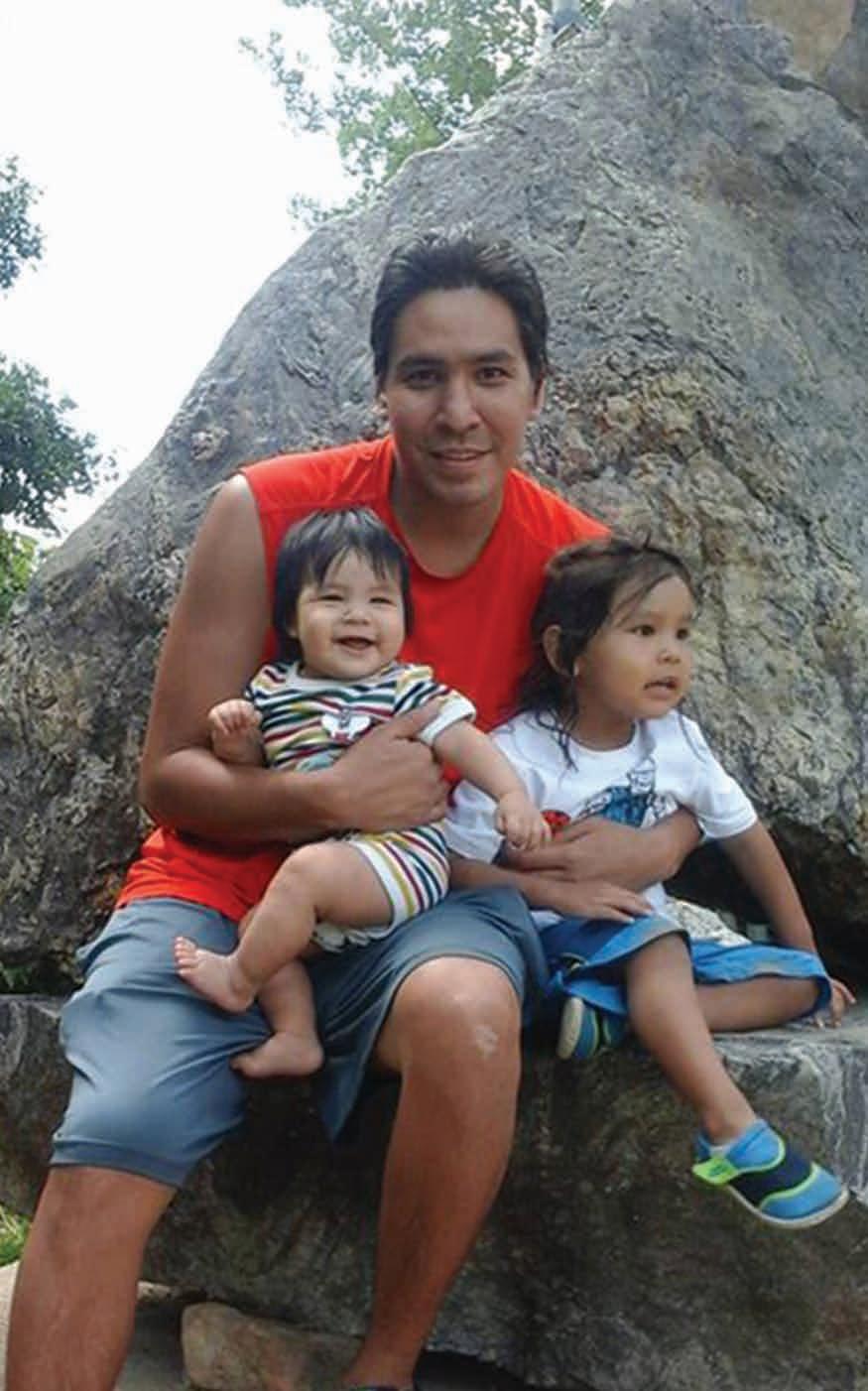
nimbaabaa means “father” in Ojibwe
Directory of Certified Adult Learning and Literacy Centres of Manitoba edu.gov.mb.ca/all/directory/pdf/all_directory.pdf
Helping Your Child Learn to Read: A Parent’s Guide edu.gov.mb.ca/k12/docs/parents/learn/read.pdf
Most traditions are practiced around holidays or at special times of the year, like during fishing or berry-picking seasons. Having traditions helps to create closeness and a sense of belonging in families. A tradition can be something that your whole community practices or it can be something that is special only within your own family. Traditions give you and your children something to plan, look forward to and do together.
There may be traditional ceremonies or practices that are carried out in your community, to celebrate pregnancy, or when a child is born, named, learns to walk or moves toward adulthood. Traditional ceremonies and practices vary by community. Learn more about your community’s traditions by talking with Elders, family, other parents, and service providers in your community. Honour your community traditions by participating in community celebrations with your children. This will help to develop their sense of pride, identity, belonging and resiliency.

Family traditions offer a great way for you to give your children positive memories of their childhood. They become times that are special and meaningful to your own family, but other families may not understand them.
Create your own traditions with your children. Make your family traditions special to your children and something that everyone in the family enjoys. You probably will find that your children will remember these traditions, talk about them often, and practice them with their own children when they grow up. Here are some ideas:
• Take a picture on the first day of school, each year.
• Call your children’s grandparents every Sunday afternoon.
• Turn off all electronic devices and play board games every Friday evening.
• Look for flowers on the first day of spring.
• Have a birthday hat that is used on all family birthdays.
• Have breakfast in bed on Saturday mornings.
• Go to the beach or to the park for a picnic on National Aboriginal Solidarity Day or go skating on Louis Riel Day.
• Cut down or put up your Christmas tree, and then decorate it together on the first Sunday in December. Play Christmas music and drink hot chocolate together, while you decorate the tree.
• Make up your own holidays, like Kid’s Day or It’s Nobody’s Birthday Day.
ate means “father” in Dakota
Play is another great way for fathers to connect with their children. It gives fathers and children a chance to have fun together and to learn about each other. Play is also the natural way that children learn about their surroundings. When children play, they explore new skills and abilities, and have opportunities to discover, improvise, create or imagine.
Provide meaningful play opportunities to strengthen your relationship with your children and enhance their learning and development. There are many different ways to play with your children.
• Watch what they are doing and join in.
• Follow their lead (as long as they are safe).
• Role model curiosity and make comments that deepen their thinking.
Respond to the teachable moments that present themselves. When you play this way, your children learn that they can make decisions. Father-child play also builds trust, leading to greater cooperation. You can turn almost any situation into playtime. Here are some ideas:
• Arts and crafts: Find some crayons or paint. Getting messy can be part of the fun.
• Dress-up: Use some old clothes and let your children’s imagination run wild.
• Music: Build your own instruments, make noise and sing together.
• Nature: Play in the snow or rain, dig in the dirt, or collect leaves or rocks. Look at nature.
• Group games: Play tag or hide and seek. Invent a game together.
• Quiet games: Teach your children card games or board games.
• Creative play: Make puppets from old socks and mittens and put on a puppet show.
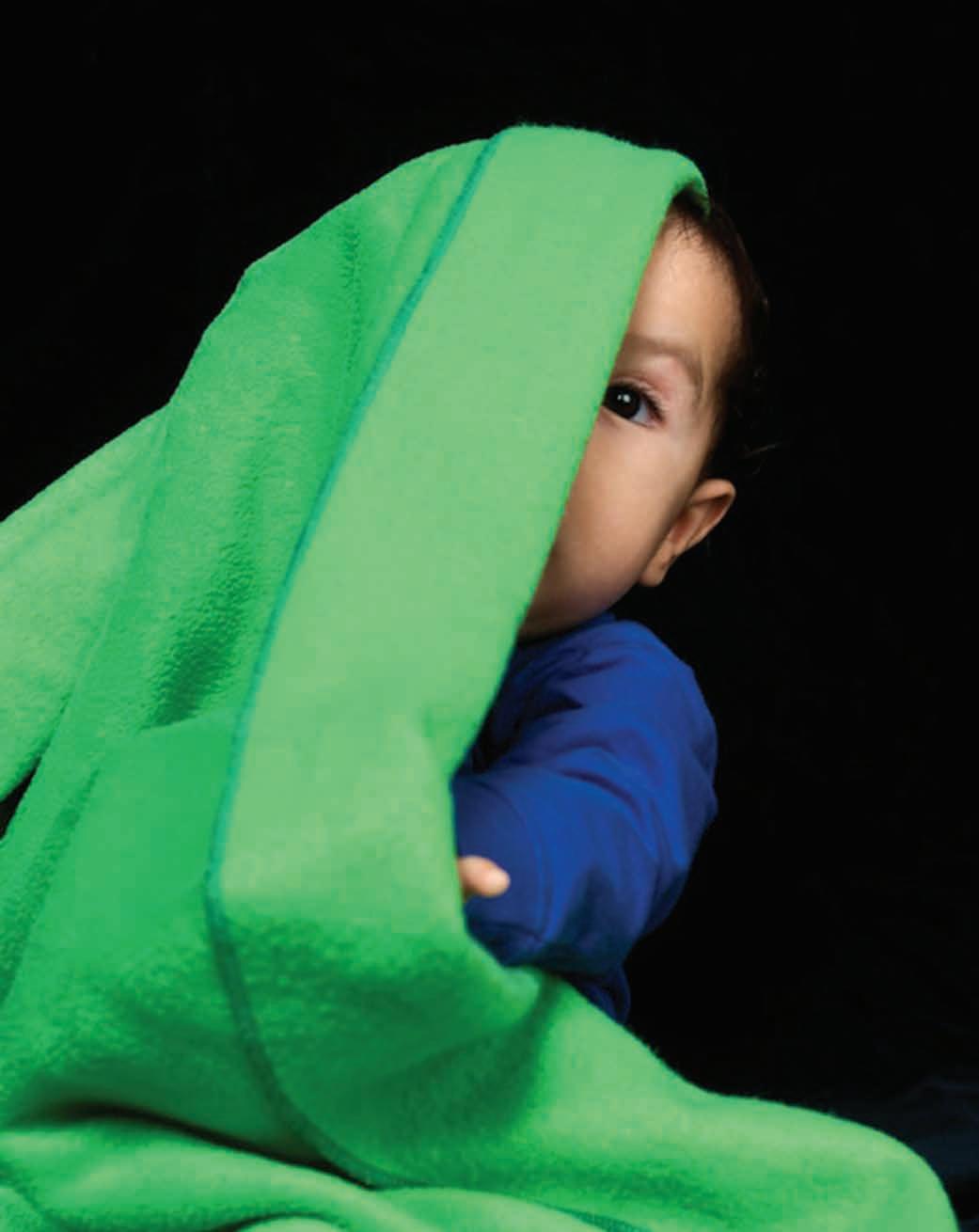
Unstructured, flexible play helps to develop children’s imagination and creativity. Children learn valuable social skills and relationship building skills through play. Play helps children to develop literacy, numeracy and physical skills, as well as problem-solving and leadership skills. Children learn about empathy and how to express their emotions through play. They also get to explore their environment and learn about independence and safe risk-taking when they play.
Structured play activities should be fun and enjoyable for children, not competitive and upsetting for them. Some competition is helpful in learning communication, negotiation and problem-solving skills. If you are playing competitive games, such as board games or musical chairs, focus on how much fun you and your children are having together, rather than on who is winning the game.

“I’ll give a quick story of my background. My mother was from Norway House and she went to residential school, never really made it back to Norway House. She met my father in Winnipeg and they had 5 children. My mom passed away in 1976 when I was only 10. My dad raised all of us 5 kids by himself. He worked hard. He wasn’t perfect but he kept us together. I remember him telling us that his friends were saying, “You can’t raise all these kids by yourself! Put them in care”. My dad would totally, absolutely, say, “That is not an option”. He kept us all together. There were three of us boys and two girls. He did the best that he could. A lot of good values came from that by keeping the family as close as he could. Before my dad passed, we used to go for breakfast and lunch all the time. I would say, “I love you” in the restaurant and give him a hug or a kiss on the cheek. That was a normal thing. He taught me to always show affection. Even to this day, when I see Elders, I show my affection by saying “I love you” and giving them a kiss on the cheek. It’s because of my father’s teachings as a child which is the only reason I’m exactly where I am today.”
Gilbert Fredette Vice Chief/Councillor Norway House Cree Nation
There are several organizations that offer a range of culturally appropriate programs, resources and services to help parents and families throughout Manitoba achieve the best possible outcomes for their children. Some of these organizations are listed below.
211 Manitoba - Connects individuals and families to thousands of government and community-based programs and services available across the province to meet the needs of diverse populations, across all different aspects of life.
Phone: 211
Web: mb.211.ca
Aboriginal Health & Wellness Centre of WinnipegProvides culturally and community-based wrap-around health and social programs and supports for Indigenous women, men and families in Winnipeg.
Phone: 204-925-3700
Web: ahwc.ca
Adult Learning and Literacy - Administers and supports the development and delivery of adult focused programming through adult learning centres and adult literacy programs in Manitoba.
Phone: 204-945-8247
Toll Free: 1-800-282-8069
Web: edu.gov.mb.ca/all/index.html
Autism Spectrum Disorders Manitoba - Provides resources and information about various stages of Autism Spectrum Disorder (ASD) to support Manitoba families who have a child, teen, or adult with ASD.
Web: asdmb.ca
Canada Prenatal Nutrition Program - Provides support to improve the health and well being of pregnant women, new mothers, and babies facing challenging life circumstances.
Web: canada.ca/en/public-health/services/childinfant-health/supports-programs-pregnancy/prenatalnutrition-program-cpnp.html
Canadian Partnership for Children’s Health and Environment - Offers online resources to help protect children’s health from environmental contaminants.
Web: healthyenvironmentforkids.ca
Child and Family All Nations Coordinated Response Network - Provides information about programs and services to help families keep their children safe from abuse and neglect.
Phone: 204-944-4200
Web: ancr.ca
Children’s disABILITY Services - Offers a variety of resources to help parents with caring for children with developmental or physical disabilities at home, in their own communities.
Phone: 204-945 -5898
Web: gov.mb.ca/fs/cds/index.html
Community Action Program for Children - Offers programs to support the healthy development of young children (birth-6 years) who are living in conditions of risk.
Web: canada.ca/en/public-health/services/child-infanthealth/community-action-program-children-capc.html
Dial-a-Dietitian - Connects callers to a registered dietitian who will listen and offer tips and suggestions about food, nutrition, and healthy eating to improve health and prevent disease.
Phone: 204-788-8248
Toll Free: 1-877-830-2892
Web: misericordia.mb.ca/programs/phcc/ dial-a-dietitian
Early Learning and Child Care Program - Supports quality, licensed, play based early learning and child care programs for children (12 weeks to 12 years) in Manitoba.
Phone: 204-945-0776
Toll Free: 1-888-213-4754
Web: gov.mb.ca/education/childcare
Find a Helpline - Offers links to several different helplines and hotlines where callers can connect with volunteers and counsellors in Manitoba to get help with a wide range of parenting and family related topics and crisis situations.
Web: findahelpline.com/countries/ca/mb
First Nations Health and Social Secretariat of Manitoba - Offers information and resources to promote awareness of health issues and referrals to programs and services to enhance the well-being of First Nations children and families in Manitoba.
Phone: 204-942-9400
Web: fnhssm.com
Health Links – Info Santé - Health Links is a bilingual phone-based program that connects individuals and families to registered nurses who provide assessment, triage, and health-care advice 24 hours a day, 7 days a week.
Phone: 204-788-8200
Toll Free: 1-888-315-9257
Web: misericordia.mb.ca/programs/phcc/ health-links-info-sante
Healthy Parenting Winnipeg - This division of the Winnipeg Regional Health Authority offers vast information and resources to support Manitoba families with healthy parenting at all ages and stages of early childhood development, from pregnancy to preschool.
Phone: 204-788-8200
Toll Free: 1-888-315-9257
Web: parentinginmanitoba.ca
Jordan’s Principle - Ensures that all First Nations children have access to the essential health, social, and educational services and supports they need, when they need it.
Toll Free: 1-833-725-8807
Web: sac-isc.gc.ca/eng/1568396042341/ 1568396159824#chp02
Manitoba Association of Friendship CentresProvides information about the programs and services offered at different friendship centres throughout Manitoba for pregnant women, children, and families.
Email: info@friendshipcentres.ca
Web: friendshipcentres.ca
Manitoba Communicable Disease ControlWorks to identify, manage, and prevent the spread of communicable diseases in Manitoba. Routine immunization schedules are available online.
Web: gov.mb.ca/health/publichealth/cdc/index.html
Manitoba Dental Association - Offers helpful information for patient dental care, including a directory of dental care providers in Manitoba.
Phone: 204-988-5300
Web: manitobadentist.ca/public-patients/ patient-resources
Manitoba FASD Network - The Manitoba FASD Network is a provincial FASD diagnostic and support organization with regional offices throughout Manitoba that offer specific programs and services for women with addictions and parents of children born with fetal alcohol spectrum disorder.
Web: fasdmanitoba.com
Manitoba First Nations Education Resource Centre -
Offers a variety of programs and resources to help with understanding and supporting the influence of early learning and development on the overall well-being of First Nations children.
Phone: 204-594-1290
Toll Free: 1-866-319-4857
Web: mfnerc.org/programs/early-learning
Manitoba Poison Centre - Provides information about poisons that can be found in the home and how to keep children and families safe from these possible dangers.
Toll Free: 1-855-776-4766
Web: manitobapoison.ca/for-families
Manitoba Prenatal Benefit - This monthly cheque helps pregnant women buy healthy foods during pregnancy. The benefit is available to all women, regardless of where they live in Manitoba.
Phone: 204-945-1301
Toll Free: 1-877-587-6224
Web: gov.mb.ca/healthychild/healthybaby/mpb.html
Manitoba Public Library Services - Offers an online directory of all public libraries in Manitoba.
Web: mb.countingopinions.com/memberlist _details.php
Metis Child, Family and Community Services - Works to strengthen the capacity of families to care for children through culturally appropriate, community-based programs and parenting supports.
Phone: 204-927-6960
Toll Free: 1-800-821-8793
Web: metiscfs.mb.ca/index.php
National Collaborating Centre for Indigenous Health (NCCIH) - The NCCIH is a source for a wide range of reliable, current, and culturally appropriate information on First Nations, Inuit, and Métis child, youth and family health.
Web: nccih.ca/34/Publication.nccih?pillar=1
Public Health Agency of Canada - Provides information about different programs and services to support health promotion and chronic disease prevention.
Toll Free: 1-844-280-5020
Web: canada.ca/en/public-health/programs.html
Red River Métis Community Resource - As the personal and family support division of the Manitoba Métis Federation, the Red River Métis Community Resource offers support services, resources, advocacy, and referrals to Métis individuals and families.
Phone: 204-586-8474
Web: mmf.mb.ca/rrm-community-resource
Rehabilitation Centre for Children - Brings together services from multiple specialized agencies that work in partnership with families to assess the needs of children and find solutions to increase function and promote quality of life.
Phone: 204-452-4311
Web: ccinc.ca/programs-and-services
sëtá means “father” in Dené
Southern First Nations Network of Care - Provides a link to a wide range of programs and services to enhance the health, well-being, and quality of life for First Nations children and families in Manitoba.
Phone: 204-783-9190
Toll Free: 1-800-665-5762
Web: southernnetwork.org/site/resources
Specialized Services for Children & Youth - Provides coordinated, regionally based services to help children and youth with disabilities and additional needs to reach their full potential.
Phone: 204-452-4311
Web: sscy.ca
© Credit:(Front cover) iStockPhoto.com, ID: 000007515021; (p. 4) Dreamstime.com, ID: 26194791; (p. 5) GettyImages.ca, ID: 87769411; (p. 6) Brenda Ducharme, private photo collection; (p. 7) AboriginalImages.ca, ID: 0924; (p. 8) iStockPhoto.com, ID: 492947012; (p. 9) Roberta Stout, private photo collection; (p. 10) Dreamstime.com, ID: 34577902; (p. 11) Rachel Brown, private photo collection; (p. 13) Dreamstime.com, ID: 71437135; (p. 14) Laura Dauphinais, private photo collection; (p. 15) iStockPhoto.com, ID: 166433708; (p. 16) Martha Troian, private photo collection; (p. 17) Brenda Ducharme, private photo collection; (p. 18) iStockPhoto.com, ID: 000019776907; (p. 19) HCMO Sept. 23, 2008, photo shoot, ID: IAN9912; (p. 20) GettyImages.ca, ID: 87769411
The booklets in this series include:
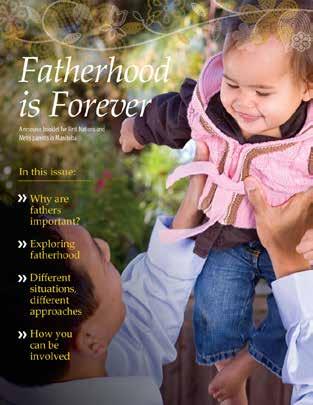

This booklet about fathering is for First Nations and Metis parents in Manitoba.

This booklet about bonding with your child is for First Nations and Metis parents in Manitoba.
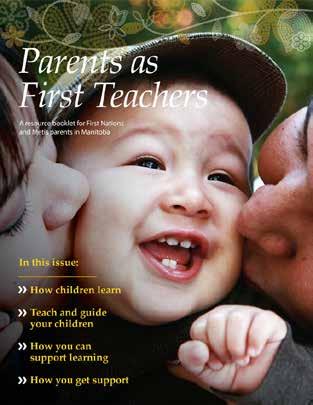
This booklet about healthy children is for First Nations and Metis parents in Manitoba.
This booklet about how children learn is for First Nations and Metis parents in Manitoba.
Available in alternate formats, on request. You can view all of the English booklets online at nccih.ca Aussi disponibles en français: ccnsa.ca
For more information:

3rd floor
332 Bannatyne Avenue
Winnipeg, MB R3A 0E2
204 945 2266
Toll Free: 1 888 848 0140 healthychild@gov.mb.ca
501 100 Park Royal South
West Vancouver, BC V7T 1A2 604 913 2080
info@fnha.ca fnha.ca

3333 University Way
Prince George, BC V2N 4Z9 250 960 5250
nccih@unbc.ca nccih.ca
nccih.ca/565/launchmanitoba-parentingbooklets.nccah